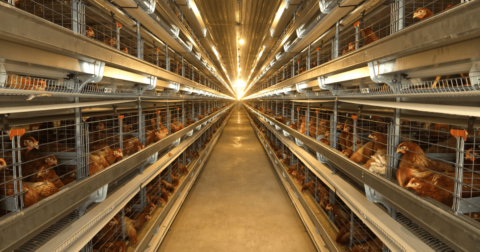Feature
Southern Right Whales Are Having Fewer Calves. Scientists Say a Warming Ocean Is to Blame.
Climate•6 min read
Reported
New research shows Rabobank provided global meat and dairy corporations with billions in financing.


Words by Claire Hamlett
A coalition of environmental groups has urged Dutch bank Rabobank to stop funding the world’s biggest and “most environmentally destructive” meat and dairy companies, following new research revealing the bank provided these companies with billions in financing between 2015 and 2021. The corporate loans and bond issuances, totaling $5.6 billion, are in “direct contradiction” with Rabobank’s climate and sustainability commitments, the groups say.
In a letter sent to Rabobank’s CEO, the coalition argues that “Rabobank’s clients in the industrial livestock sector are key drivers of climate change and deforestation, and exacerbate risks of food insecurity, future pandemics, workers’ rights and animal welfare” and almost none have plans to reduce their supply chain emissions or livestock numbers. It also warns that Rabobank’s continued financing of meat companies leaves it at risk of bearing financial losses if the Dutch government proceeds with its plan to reduce livestock numbers in the Netherlands by 30 percent.
Rabobank is one of the world’s biggest financiers of industrial meat and dairy companies, according to the research by Feedback EU, Feedback Global, World Animal Protection, BankTrack and International Accountability Project. “Rabobank’s core international business is in the food and agriculture sectors, and they position themselves as a bank supporting a sustainable food system,” said Frank Mechielsen, director of Feedback EU, “so it’s particularly important that we hold them to account for being one of the biggest financial supporters of environmentally destructive industrial livestock companies globally.”
Among the bank’s clients are JBS, Marfrig, Tyson Foods, Dairy Farmers of America, and Fonterra, five of the largest livestock companies whose combined greenhouse gas emissions in 2021 were an estimated 550.8 million metric tons, nearly equal to the combined emissions of the Netherlands and the UK. JBS is the company to which Rabobank provided the most support, with $1.08 billion in corporate loans, underwriting $491 million in bond issuances and providing revolving credit facilities. The Brazilian meat giant has been accused multiple times of sourcing deforestation-linked beef from the Amazon rainforest as well as massively underreporting its own emissions.
Inadequate emissions reporting is a problem with most meat and dairy companies, which tend to exclude the bulk of their emissions — those in their supply chains, also known as scope 3 emissions — and have poor records of setting emissions reduction targets. Major meat and dairy companies, including ones financed by Rabobank, have also been found to be delaying climate action and green-washing its business practices. The meat industry as a whole has copied tactics of the fossil fuel industry to protect their interests.
These companies have “a huge structural imperative to defend the growth of their industry,” said Mechielsen, as they have “so much invested in industrial livestock production – land, farm buildings, processing factories, institutional knowledge and other infrastructure.” Like fossil fuel companies, they “do not want to risk ‘stranded assets.’”
Financing global livestock conglomerates seems to fly in the face of Rabobank’s climate commitments. In 2019, Rabobank became a signatory to the Dutch Climate Agreement, the main goal of which is to reduce the Netherlands’ GHG emissions by 49 percent by 2030 compared to 1990 levels.
Part of this effort is a reduction in the number of farmed animals in the country in a bid to bring down nitrogen emissions produced by huge amounts of animal waste. “Food Transition” also forms one of the three main pillars of the strategy outlined in Rabobank’s “Our Road to Paris” report. But Rabobank has made no commitments to roll back its financing of meat and dairy companies, stating that there are still questions to answer about what net-zero means for the agricultural sector.
Sentient Media reached out to Rabobank for comment, who provided a statement that it endorses Paris climate goals: “If customers do not comply with our sustainability requirements, we discuss this and as a bank we can reconsider the financial relationship with a client if there are no changes regarding climate policies.”
The statement continued, “Feedback EU raises important concerns and we would like to refer them to our climate report, in which we describe how we want to help the sectors with the most emissions to meet the climate goals. It states, for example, that from 2027 (or earlier if required by law) we will only finance customers in sectors with high emissions if they have scientifically substantiated CO2 reduction targets. We invite the senders of the letter to discuss this.”
As with fossil fuel companies, there is skepticism among environmental campaigners that meat and dairy companies can make themselves genuinely greener, namely through pivoting to producing plant-based meat alternatives. Those with plant-based ranges view them as value added and remain intent on growing their animal protein business simultaneously.
This makes the case for banks cutting ties with these companies even stronger, in Mechielsen’s view “Banks often justify their financing of industrial livestock companies by saying they prefer to engage with companies rather than defund them,” he said. “However, industrial livestock companies show no sign of wanting to, or being capable of reform – and certainly not in the timescales needed to avert climate crisis.”
A number of financial institutions have already begun withdrawing support for the meat and dairy industry. The fourth largest bank in the Netherlands, De Volksbank, avoids investing in livestock farming and related operations such as slaughterhouses and livestock transport “because it (currently) involves problems in the areas of food security, climate change, biodiversity, health and human rights.”
In 2020, Nordea Asset Management sold €40 million in shares in JBS due to its links to deforestation and history of corruption. The UK’s biggest asset manager, Legal & General Investment Management, divested from industrial dairy company China Mengniu Dairy in 2021 for “not meeting what we consider to be baseline minimum standard expectations in terms of climate change management.”
“Defunding industrial livestock on any scale makes a powerful statement that industrial livestock companies are socially and environmentally unacceptable and should be regulated,” said Mechielsen, “and shows vital leadership to help ensure defunding industrial livestock becomes a trend across the finance sector that materially impacts these companies.”
This piece has been updated.